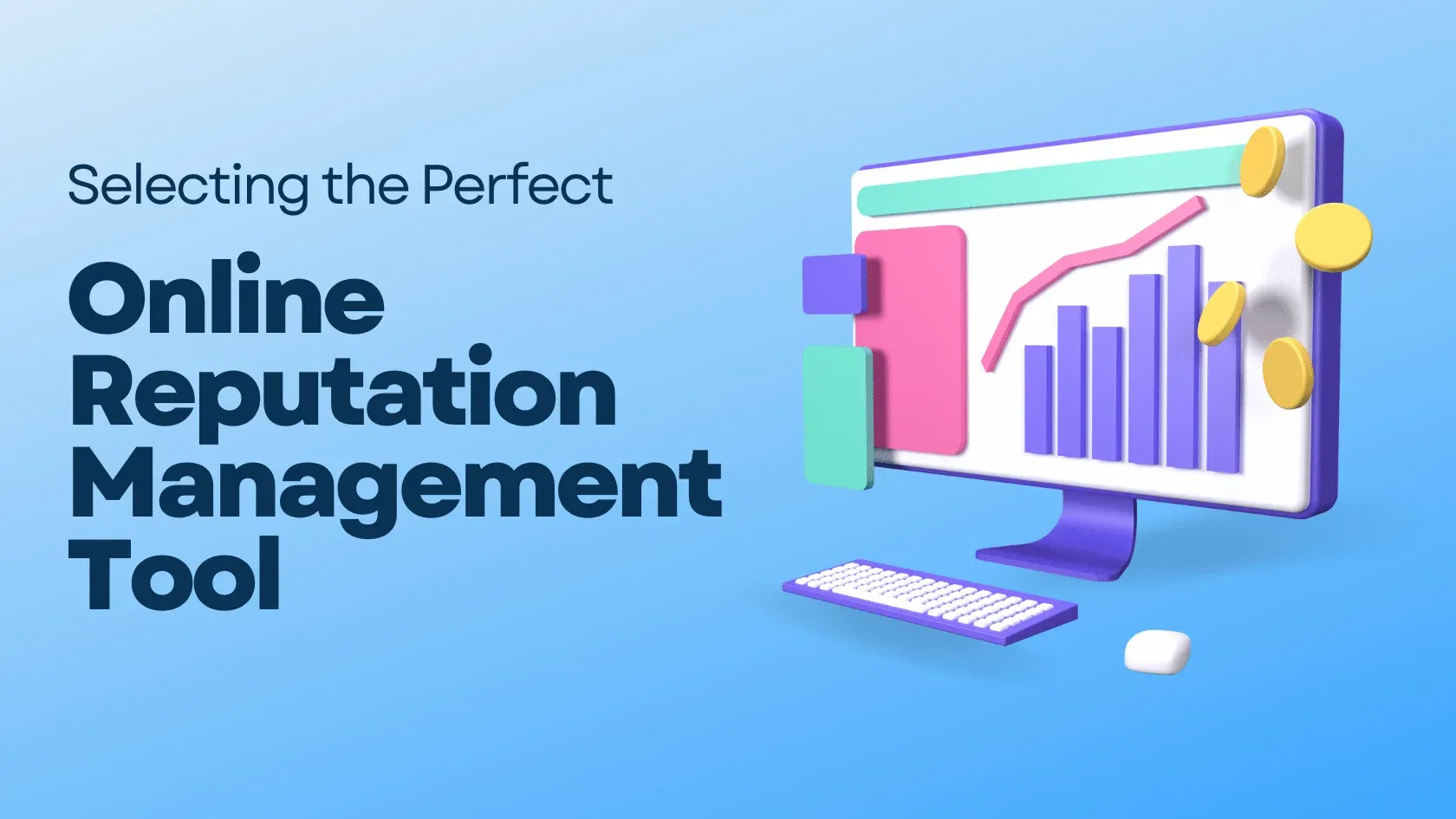Introduction to Online Reputation Management Tools
Online reputation management has become a critical aspect of running a successful business in today’s digital age. With the rise of social media and online review platforms, businesses are constantly being scrutinized by customers and competitors. It is essential for businesses to actively manage their online reputation to maintain a positive brand image and attract new customers.
In this blog post, we will explore the role of online reputation management in business and delve into the various tools available to help businesses effectively manage their online reputation. We will discuss the importance of maintaining a positive online presence, the impact of online reviews and feedback on business growth, and the key features to look for in online reputation management tools.
The Role of Online Reputation Management in Business
Online reputation management plays a crucial role in shaping how a business is perceived by its target audience. It involves monitoring and influencing online conversations and reviews to ensure that a business’s reputation remains positive. By actively managing their online reputation, businesses can build trust, establish credibility, and attract new customers.
Furthermore, online reputation management allows businesses to address and resolve any negative feedback or complaints promptly. By responding to customer concerns and taking appropriate action, businesses can demonstrate their commitment to customer satisfaction and improve their overall reputation.
Defining Online Reputation Management Tools
Online reputation management tools are software or platforms that help businesses monitor, analyze, and influence their online reputation. These tools provide businesses with valuable insights into what customers are saying about their brand, products, or services across various online platforms.
Online reputation management tools offer a range of features, such as social listening and monitoring, responding to online reviews, managing posting schedules, competitor analysis, sentiment analysis, and more. These features enable businesses to proactively manage their online reputation and make informed decisions to improve their brand image.
Why Online Reputation Management is Crucial for Businesses
Importance of Maintaining a Positive Online Presence
A positive online presence is vital for businesses as it directly impacts their reputation and credibility. In today’s digital landscape, potential customers often rely on online reviews and feedback to make purchasing decisions. A strong online reputation can significantly influence a customer’s perception of a business and ultimately drive sales.
By actively managing their online reputation, businesses can ensure that positive reviews and testimonials are highlighted, while negative feedback is addressed promptly and effectively. This proactive approach helps businesses maintain a positive online presence and build trust with their target audience.
Impact of Online Reviews and Feedback on Business Growth
Online reviews and feedback have a profound impact on a business’s growth and success. Studies have shown that a significant percentage of consumers trust online reviews as much as personal recommendations. Positive reviews can attract new customers, increase sales, and improve a business’s overall reputation.
On the other hand, negative reviews can damage a business’s reputation and deter potential customers. It is crucial for businesses to monitor and respond to online reviews promptly and professionally. By addressing customer concerns and resolving issues, businesses can turn negative experiences into positive ones and demonstrate their commitment to customer satisfaction.
Key Features of Online Reputation Management Tools
Online reputation management tools offer a wide range of features to help businesses effectively manage their online reputation. Let’s explore some of the essential functions these tools provide:
1. Social Listening and Monitoring
Social listening and monitoring is a critical feature of online reputation management tools. It involves tracking and analyzing online conversations, mentions, and reviews related to a business or brand. By monitoring social media platforms, review sites, and other online channels, businesses can stay informed about what customers are saying and quickly address any issues or concerns.
These tools provide businesses with real-time alerts and notifications, allowing them to respond promptly to customer feedback and engage in meaningful conversations. Social listening and monitoring help businesses proactively manage their online reputation and identify opportunities for improvement.
2. Responding to Online Reviews
Online reputation management tools enable businesses to respond to online reviews from a centralized platform. These tools streamline the review response process, making it easier for businesses to address customer feedback and resolve issues.
By responding to online reviews promptly and professionally, businesses can demonstrate their commitment to customer satisfaction and show potential customers that they value their feedback. Online reputation management tools provide businesses with templates and automation features to help streamline the review response process and ensure consistent messaging.
3. Managing Posting Schedules
Consistent and strategic posting on social media platforms is essential for maintaining a positive online presence. Online reputation management tools allow businesses to schedule and manage their social media posts from a single platform.
These tools provide businesses with features such as content calendars, post scheduling, and analytics to help them plan and execute their social media strategies effectively. By maintaining a consistent posting schedule, businesses can engage with their audience, share valuable content, and enhance their online reputation.
4. Competitor Analysis and Sentiment Analysis
Online reputation management tools offer advanced features such as competitor analysis and sentiment analysis. Competitor analysis helps businesses understand how their brand is perceived in comparison to their competitors. By monitoring and analyzing competitor mentions and reviews, businesses can identify areas for improvement and stay ahead of the competition.
Sentiment analysis, on the other hand, involves analyzing the sentiment or tone of online conversations and reviews. These tools use natural language processing algorithms to determine whether the sentiment is positive, negative, or neutral. Sentiment analysis provides businesses with valuable insights into customer perceptions and helps them identify trends and patterns.
Advanced Features to Look for
In addition to the essential functions mentioned above, there are several advanced features that businesses should consider when choosing an online reputation management tool:
1. AI and Automation Capabilities
AI-powered online reputation management tools can automate various tasks, such as sentiment analysis, review response, and social media scheduling. These tools use machine learning algorithms to analyze data and make intelligent recommendations. AI and automation capabilities can save businesses time and resources, allowing them to focus on other aspects of their operations.
2. Integration with Third-Party Tools
Integration with other tools and platforms is crucial for seamless workflow and efficient online reputation management. Businesses should look for online reputation management tools that can integrate with their existing CRM systems, social media management tools, and other relevant platforms. Integration allows businesses to streamline their processes and access all the necessary data from a centralized location.
Assessing Your Business Needs for Reputation Management
Identifying Specific Reputation Challenges
Before choosing an online reputation management tool, it is important to identify the specific reputation challenges your business is facing. Conduct a thorough analysis of your online presence and assess areas where improvement is needed. Are you struggling with negative reviews? Do you need better social media management? Understanding your specific challenges will help you choose a tool that addresses your unique needs.
Aligning Tool Capabilities with Business Goals
Once you have identified your reputation challenges, it is essential to align the capabilities of the online reputation management tool with your business goals. Consider what you want to achieve with your online reputation management efforts. Are you looking to increase positive reviews? Do you want to improve customer satisfaction? By aligning the tool’s capabilities with your business goals, you can ensure that you are investing in a tool that will deliver results.
How to Choose the Right Online Reputation Management Tool
Researching and Comparing Different Tools
Choosing the right online reputation management tool requires thorough research and comparison. Start by identifying the top tools in the market and gather information about their features, pricing, and customer reviews. Look for tools that have a proven track record and positive customer feedback.
Consider reaching out to industry peers or consulting with experts to get their recommendations. Take advantage of free trials or demos offered by the tools to get a firsthand experience of their capabilities. The more research you do, the better equipped you will be to make an informed decision.
Evaluating Tool Efficiency and User Experience
Efficiency and user experience are crucial factors to consider when choosing an online reputation management tool. Evaluate how user-friendly the tool is and whether it integrates seamlessly with your existing systems. Consider the learning curve and training requirements for your team members.
Additionally, assess the tool’s efficiency in terms of data analysis, reporting, and automation. Look for tools that provide comprehensive analytics and reporting features to help you track the impact of your reputation management efforts.
Considering Pricing Models and Budget Constraints
When choosing an online reputation management tool, it is important to consider your budget constraints. Evaluate the pricing models offered by different tools and determine which one aligns with your budget and expected return on investment.
Keep in mind that investing in a reputable online reputation management tool is a long-term investment in your brand’s reputation. Consider the value the tool will bring to your business and weigh it against the cost.
Top Online Reputation Management Tools in the Market
Overview of Popular Tools
Managing your online reputation is crucial in today’s digital age. With the power of social media and the internet, a single negative review or comment can significantly impact your business. That’s why it’s essential to have the right tools to monitor and manage your online reputation effectively. In this article, we’ll explore some of the top online reputation management (ORM) tools available in the market and their pros and cons.
Sprout Social
Sprout Social is a comprehensive social media management tool that offers excellent analytics and monitoring capabilities. It allows you to monitor mentions of your brand across various social media platforms, track engagement metrics, and analyze audience demographics. With Sprout Social, you can easily identify trends, measure the impact of your social media efforts, and engage with your audience effectively.
Pros:
- Comprehensive social media management
- Excellent analytics and reporting
Cons:
- Can be pricey for small businesses
- Steep learning curve for beginners
Google Alerts
Google Alerts is a free and easy-to-use tool that allows you to monitor mentions of your brand or specific keywords across the web. It sends you email notifications whenever new content containing your specified keywords is indexed by Google. While Google Alerts is a basic monitoring tool, it can be a useful starting point for small businesses or individuals looking for a simple way to keep track of their online reputation.
Pros:
- Free and easy to use
- Good for basic monitoring
Cons:
- Limited in depth and customization
Semrush
Semrush is a robust SEO tool that also offers online reputation management functionalities. It provides comprehensive SEO analysis, keyword research, and competitor analysis. With Semrush, you can monitor your brand’s online presence, track mentions, and analyze sentiment. While Semrush is a powerful tool, it can be overwhelming for beginners due to its extensive features and relatively high price point.
Pros:
- Robust SEO and online reputation functionalities
Cons:
- Can be overwhelming for beginners
- Relatively expensive
Reputation.com
Reputation.com is a comprehensive online reputation management platform that offers a wide range of features, including review management, sentiment analysis, and social media monitoring. It allows businesses to monitor and respond to customer reviews, track their online reputation, and improve their overall brand perception. While Reputation.com provides a comprehensive solution for managing online reputation, it is more suited for larger enterprises than small businesses due to its pricing.
Pros:
- Wide range of features including review management
Cons:
- More suited for larger enterprises than small businesses
Brand24
Brand24 is a real-time social media monitoring tool that allows you to track mentions of your brand, monitor sentiment, and analyze social media conversations. It provides valuable insights into how your brand is perceived online and helps you identify potential issues or opportunities. While Brand24 offers real-time monitoring, it has limited historical data access in its lower-tier plans.
Pros:
- Real-time social media monitoring
- Sentiment analysis
Cons:
- Limited historical data access in lower-tier plans
Birdeye
Birdeye is a comprehensive platform that integrates customer experience and online reputation management. It allows businesses to monitor and manage customer reviews, collect feedback, and improve their overall online reputation. Birdeye offers features such as review monitoring, sentiment analysis, and customer feedback management. However, it can be costly and is more focused on customer feedback than broader online reputation management.
Pros:
- Integrates customer experience and online reputation
Cons:
- Can be costly
- More focused on customer feedback
Hootsuite
Hootsuite is a popular social media management tool that allows businesses to manage and schedule posts across multiple social media platforms. While Hootsuite offers strong social media management capabilities, its analytics can be basic without add-ons or integrations with other tools.
Pros:
- Strong social media management capabilities
Cons:
- Analytics can be basic without add-ons
Podium
Podium is a platform that streamlines messaging and reviews on multiple platforms, including Google, Facebook, and more. It allows businesses to manage customer interactions, respond to reviews, and improve their online reputation. While Podium primarily focuses on messaging and review management, it may not provide a comprehensive solution for all aspects of online reputation management.
Pros:
- Streamlines messaging and reviews on multiple platforms
Cons:
- Primarily focused on messaging, not comprehensive for ORM
Yext
Yext is an excellent tool for managing local listings and ensuring accurate business information across various online directories. It also offers strong analytics and reporting capabilities to track your online reputation. While Yext is great for managing local listings, it can be expensive and may have a complex setup for beginners.
Pros:
- Excellent for managing local listings
- Strong analytics and reporting
Cons:
- Can be expensive
- Complex setup for beginners
Mention
Mention is a real-time monitoring tool that allows businesses to track mentions of their brand, competitors, and industry across the web and social media. It provides valuable insights into brand sentiment, helps identify potential crises, and allows for competitive analysis. While Mention offers real-time monitoring, some advanced features may have a steep learning curve for beginners.
Pros:
- Real-time monitoring
- Competitive analysis
Cons:
- Can be costly
- Steep learning curve for advanced features
Trustpilot
Trustpilot is a reputable platform for customer reviews and ratings. It allows businesses to collect and manage customer reviews, respond to feedback, and build trust with potential customers. While Trustpilot is mainly focused on reviews, it may be limited in other aspects of online reputation management.
Pros:
- Reputable platform for customer reviews
Cons:
- Mainly review-focused, limited in other ORM aspects
BrightLocal
BrightLocal is a tool tailored for local businesses that offers comprehensive local SEO tools. It allows businesses to manage their online presence, monitor local citations, and track their local search rankings. While BrightLocal provides valuable local SEO insights, it mainly focuses on local SEO rather than broader online reputation management.
Pros:
- Tailored for local businesses
- Comprehensive local SEO tools
Cons:
- Mainly focuses on local SEO rather than broad ORM
Ahrefs
Ahrefs is an excellent SEO tool known for its backlink analysis capabilities. While Ahrefs is primarily an SEO tool, it can also provide insights into your online reputation by analyzing backlinks, tracking mentions, and monitoring your brand’s visibility in search results. However, it is not specifically an ORM tool and may be more SEO-focused.
Pros:
- Excellent for backlink analysis
- Strong SEO tool
Cons:
- Not specifically an ORM tool
- More SEO-focused
ReviewTrackers
ReviewTrackers is an effective tool for tracking and managing online reviews. It allows businesses to monitor customer reviews from various platforms, respond to feedback, and gain insights into customer sentiment. While ReviewTrackers is primarily focused on review management, it may lack broader ORM features.
Pros:
- Effective for tracking and managing online reviews
Cons:
- Primarily review management
- Lacks broader ORM features
BuzzSumo
BuzzSumo is a tool that focuses on content analysis and social listening. It allows businesses to analyze content performance, track social media engagement, and identify trending topics. While BuzzSumo is great for content marketing, it may be more suited for content analysis and social listening than pure online reputation management.
Pros:
- Great for content analysis and social listening
Cons:
- More suited for content marketing than pure ORM
Implementing the Chosen Online Reputation Management Tool
Best Practices for Tool Setup and Integration
Once you have chosen an online reputation management tool, it is important to follow best practices for tool setup and integration. Here are some key steps to consider:
- 1. Define your goals: Clearly define your goals for online reputation management and align them with the capabilities of the tool.
- 2. Set up monitoring parameters: Configure the tool to monitor mentions, keywords, and social media platforms relevant to your business.
- 3. Customize notifications: Set up notifications and alerts to ensure that you are promptly notified of any mentions or reviews.
- 4. Integrate with existing systems: If applicable, integrate the online reputation management tool with your existing CRM or social media management systems for seamless workflow.
- 5. Train team members: Provide training to your team members on how to effectively use the tool and leverage its features.
Training Team Members and Creating SOPs
Training team members on how to use the chosen online reputation management tool is crucial for its successful implementation. Conduct training sessions or provide access to training materials to ensure that your team members are well-equipped to leverage the tool’s features.
In addition to training, it is important to create standard operating procedures (SOPs) for using the tool. SOPs outline the best practices and guidelines for managing the online reputation of your business. They ensure consistency and efficiency in your reputation management efforts.
Monitoring and Measuring the Impact of Your Online Reputation Tool
Setting Up Key Performance Indicators
Setting up key performance indicators (KPIs) is essential for measuring the impact of your online reputation management tool. KPIs help you track the effectiveness of your reputation management efforts and identify areas for improvement.
Some common KPIs for online reputation management include:
- 1. Number of positive/negative reviews
- 2. Average rating or sentiment score
- 3. Response time to customer feedback
- 4. Increase in positive brand mentions
- 5. Increase in customer satisfaction ratings
Regularly Reviewing Tool Performance and Impact
Regularly reviewing the performance and impact of your online reputation management tool is crucial for continuous improvement. Monitor the KPIs you have set and analyze the data provided by the tool to assess the effectiveness of your reputation management efforts.
Identify trends, patterns, and areas for improvement. Use the insights gained from the tool to refine your reputation management strategies and make data-driven decisions to enhance your online reputation.
Adapting Your Strategy for Proactive Online Reputation Management
Shifting from Reactive to Proactive Reputation Management
While reactive reputation management is essential for addressing customer concerns and resolving issues, proactive reputation management is equally important for maintaining a positive online presence. Proactive reputation management involves actively shaping and influencing your online reputation.
To adapt your strategy for proactive reputation management, consider the following:
- 1. Engage with your audience: Regularly engage with your audience on social media platforms and other online channels. Respond to positive comments, answer questions, and thank customers for their feedback.
- 2. Share valuable content: Create and share valuable content that resonates with your target audience. This can include blog posts, videos, infographics, and more. By providing valuable content, you can establish yourself as an industry thought leader and build trust with your audience.
- 3. Encourage positive reviews: Actively encourage your satisfied customers to leave positive reviews and testimonials. This can be done through email campaigns, social media posts, or even incentives such as discounts or giveaways.
Staying Ahead of Trends and Market Changes
Staying ahead of trends and market changes is crucial for proactive online reputation management. Monitor industry trends, keep an eye on your competitors, and adapt your strategies accordingly. By staying informed and proactive, you can anticipate potential reputation challenges and take proactive measures to mitigate any negative impact.
Common Mistakes to Avoid in Online Reputation Management
Identifying and Mitigating Potential Pitfalls
While online reputation management is essential for businesses, there are common mistakes that businesses should avoid. By identifying and mitigating these potential pitfalls, businesses can ensure that their reputation management efforts are effective and yield positive results.
Some common mistakes to avoid include:
- 1. Ignoring negative feedback: Ignoring negative feedback or failing to address customer concerns can significantly damage a business’s reputation. It is important to respond promptly and professionally to all customer feedback, whether positive or negative.
- 2. Overreacting to negative reviews: While it is important to address negative reviews, it is equally important not to overreact or engage in arguments with customers. Maintain a calm and professional tone in all interactions.
- 3. Failing to monitor all online channels: It is crucial to monitor all online channels where your brand is mentioned, including social media platforms, review sites, forums, and more. Failing to monitor all channels can result in missed opportunities or negative brand perception.
Learning from Common Business Errors
Learning from common business errors and the mistakes of others is a valuable lesson in online reputation management. Stay informed about case studies and real-life examples of reputation management successes and failures. By learning from others’ experiences, you can avoid making similar mistakes and implement effective strategies in your own business.
Conclusion: Enhancing Your Brand’s Online Reputation
Final Thoughts on Choosing the Right Tool
Choosing the right online reputation management tool is crucial for enhancing your brand’s online reputation. Consider your specific business needs, evaluate the features and capabilities of different tools, and align them with your goals and budget. Investing in the right tool will help you effectively manage your online reputation and drive business growth.
Future Outlook and Continuous Improvement in Reputation Management
Online reputation management is an ongoing process that requires continuous improvement and adaptation. Stay informed about the latest trends and technologies in reputation management and continuously evaluate and refine your strategies.
As the digital landscape evolves, new challenges and opportunities will arise. By staying ahead of the curve and continuously improving your reputation management efforts, you can enhance your brand’s online reputation and drive long-term success.



